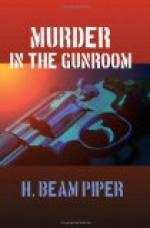On the whole, the Rosemont Bayonet Murder was, from a journalistic standpoint, an almost complete bust. There had been no arrest, no hearing, no protracted trial, no sensational revelations. Only one monolithic fact, officially attested and indisputable, loomed out of the murk: “... and the said Frederick Parker Dunmore, deceased, did receive the aforesaid gunshot-wounds, hereinbefore enumerated, at the hands of the said Jefferson Davis Rand and at the hands of the said David Abercrombie Ritter ...” and “... the said Jefferson Davis Rand and the said David Abercrombie Ritter, being in mortal fear for their several lives, did so act in defense of their several persons...” and, finally, “... the said Frederick Parker Dunmore did die.”
The Evening Mercury, which sheet the said Jefferson Davis Rand had once cost the loss of an expensive libel-suit and exposed in certain journalistic malpractices verging upon blackmail, promptly burst into print with an indignant editorial entitled Trial by Pistol. The terms: “legalized slaughter,” and “flagrant whitewash,” were used, and mention was made of “the well known preference of a certain notorious private detective for the procedure of habeas cadaver.” The principal result of this outcry was to persuade an important New Belfast manufacturer, who had hitherto resisted Rand’s sales pressure, to contract with the Tri-State Agency for the protection of his payroll deliveries.
Then, at the other end of the state, the professor of Moral Science at a small theological seminary caught his wife in flagrante delicto with one of the fourth-year students and opened fire upon them, at a range of ten feet, with a 12-gauge pump-gun. The Rosemont Bayonet Murder, already pretty well withered on the vine, passed quietly into limbo.
* * * * *
Summer, almost a month before its official opening, was already a fait accompli. The trees were in full leaf and invaded by nesting birds, the air was fragrant with flower scents, and the mercury column of the thermometer was stretching itself up toward the ninety mark.
They were all outside, where the long shadow of the Fleming house fell across the lawn and driveway, gathered about the five parked cars. The new Fleming butler, a short and somewhat globular Negro with a gingerbread-crust complexion and an air of affable dignity, was helping Pierre Jarrett and Karen Lawrence put a couple of cartons and a tall peach-basket into Pierre’s Plymouth. Colin MacBride, a streamer of pipe-smoke floating back over his shoulder, was peering into his luggage-compartment to check the stowage of his own cargo, while his twelve-year-old son, Malcolm, another black Highlander like his father, was helping Philip Cabot carry a big laundry hamper full of newspaper-wrapped pistols to his Cadillac. Pierre’s mother, and the stylish-stout Mrs. Trehearne, and Gladys Fleming, obviously detached from the bustle of pre-departure preparations, were standing to one side, talking. And Rand had finished helping Adam Trehearne pack the last container of his share of the Fleming collection into his car.




